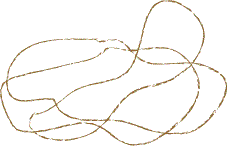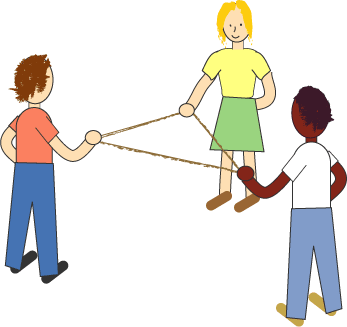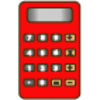Skip over navigation
Mrs Trimmer's class had been drawing different shapes with straight sides. On Tuesday the sun was shining and Mrs Trimmer took all twenty-four of the children out into the playground. She also took some long loops of string.

Mrs Trimmer held up one of the string loops. "How many of you will we need to make a triangle?" she asked.
She chose Ellie, Winston and Andy. They held the string tight and so made a beautiful triangle.

Then other children made triangles, squares, rectangles, pentagons and hexagons. Some made regular polygons and others made more irregular shapes.

Six of the class made a shape. Nick pointed at it. "That's nearly a triangle!" he laughed. Mrs Trimmer came up. "It's still a hexagon," she explained, "It's got six sides and six people holding the corners."
After a while Mrs Trimmer called all the twenty-four children together. "Now we are all going to make triangles," she said, "So get into threes." They made lots of different ones. Some looked like these:

If all the children were making a triangle, how many triangles did they make altogether?
Then the children made four-sided shapes.
What different shapes could they have made?
Can you draw some of them?
How many four-sided shapes did the class make altogether if all the children were involved?
Then the children made hexagons and then octagons.
How many hexagons and how many octagons could the class make?
"We haven't made pentagons yet, Mrs Trimmer," complained Nick.
How do you think they managed to make five good pentagons?


Or search by topic
Number and algebra
Geometry and measure
Probability and statistics
Working mathematically
Advanced mathematics
For younger learners
Mrs Trimmer's String
Age 5 to 7
Challenge Level 





Mrs Trimmer's class had been drawing different shapes with straight sides. On Tuesday the sun was shining and Mrs Trimmer took all twenty-four of the children out into the playground. She also took some long loops of string.

Mrs Trimmer held up one of the string loops. "How many of you will we need to make a triangle?" she asked.
They said "Three!"
She chose Ellie, Winston and Andy. They held the string tight and so made a beautiful triangle.

Then other children made triangles, squares, rectangles, pentagons and hexagons. Some made regular polygons and others made more irregular shapes.

Six of the class made a shape. Nick pointed at it. "That's nearly a triangle!" he laughed. Mrs Trimmer came up. "It's still a hexagon," she explained, "It's got six sides and six people holding the corners."
After a while Mrs Trimmer called all the twenty-four children together. "Now we are all going to make triangles," she said, "So get into threes." They made lots of different ones. Some looked like these:
If all the children were making a triangle, how many triangles did they make altogether?
Then the children made four-sided shapes.
What different shapes could they have made?
Can you draw some of them?
How many four-sided shapes did the class make altogether if all the children were involved?
Then the children made hexagons and then octagons.
How many hexagons and how many octagons could the class make?
"We haven't made pentagons yet, Mrs Trimmer," complained Nick.
How do you think they managed to make five good pentagons?
You may also like
Biscuit Decorations
Andrew decorated 20 biscuits to take to a party. He lined them up and put icing on every second biscuit and different decorations on other biscuits. How many biscuits weren't decorated?
Constant Counting
You can make a calculator count for you by any number you choose. You can count by ones to reach 24. You can count by twos to reach 24. What else can you count by to reach 24?

